人教版(2019)选择性必修 第一册Unit 5 Working the Land Learning About Language课件(共28张PPT)
文档属性
| 名称 | 人教版(2019)选择性必修 第一册Unit 5 Working the Land Learning About Language课件(共28张PPT) |  | |
| 格式 | pptx | ||
| 文件大小 | 1.9MB | ||
| 资源类型 | 教案 | ||
| 版本资源 | 人教版(2019) | ||
| 科目 | 英语 | ||
| 更新时间 | 2023-11-06 10:53:58 | ||
图片预览

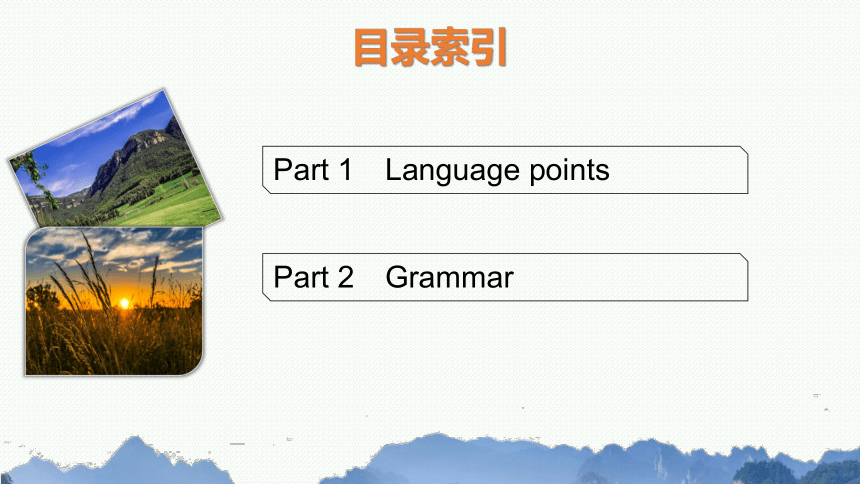
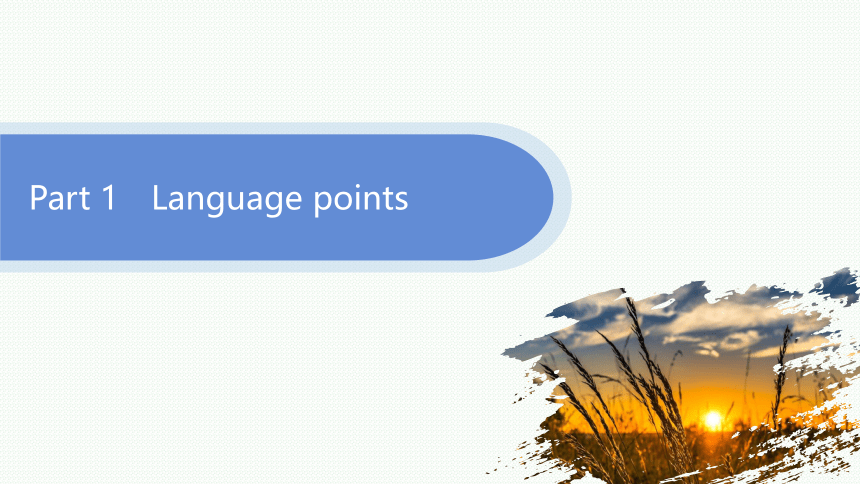
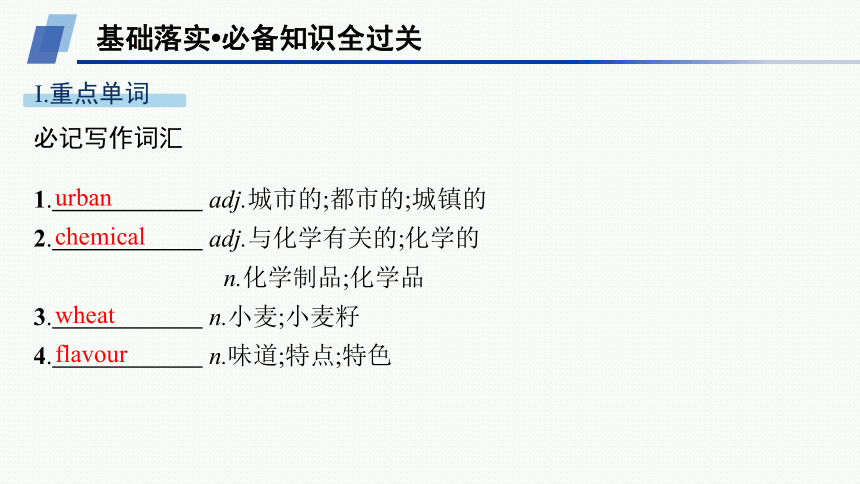
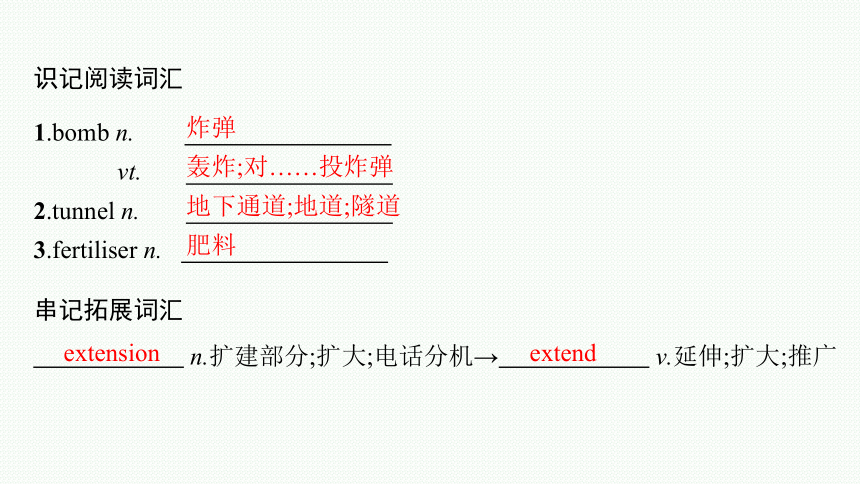
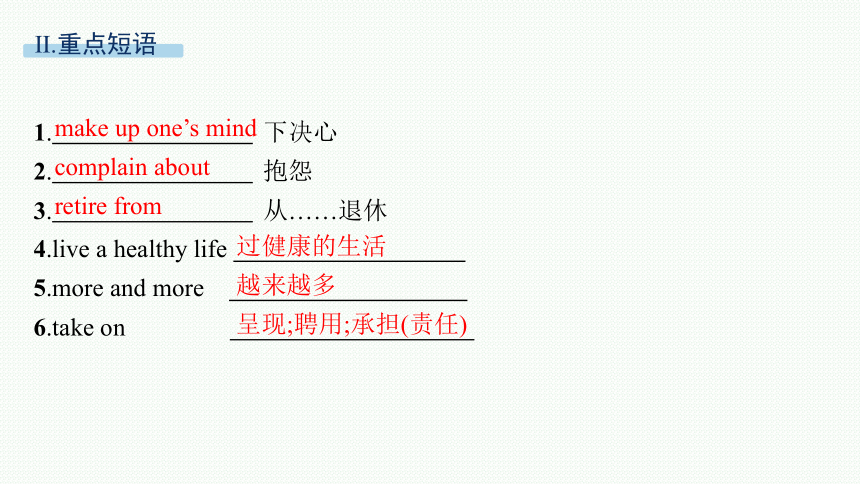
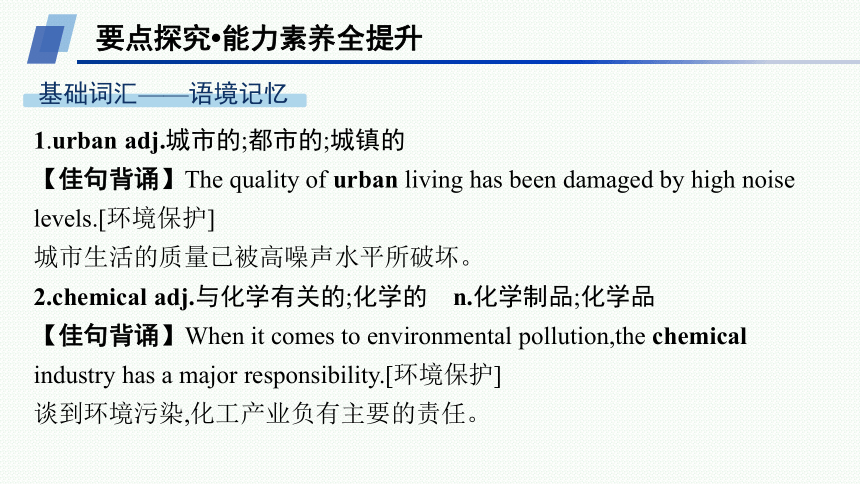
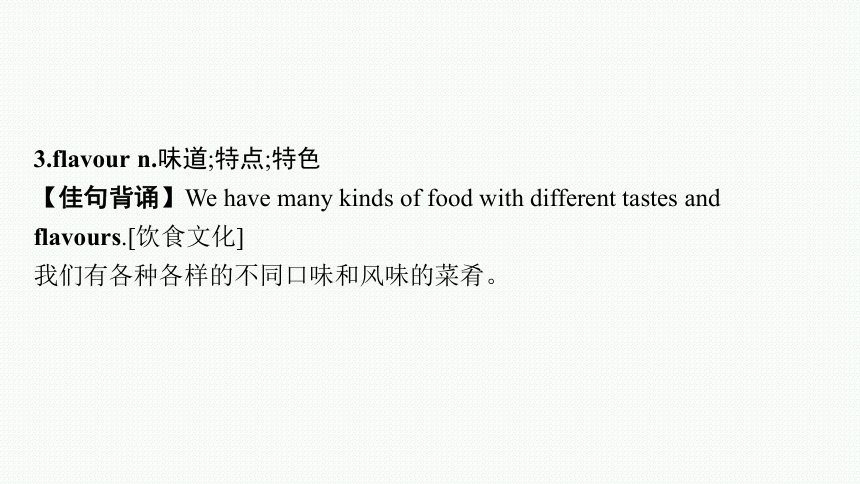
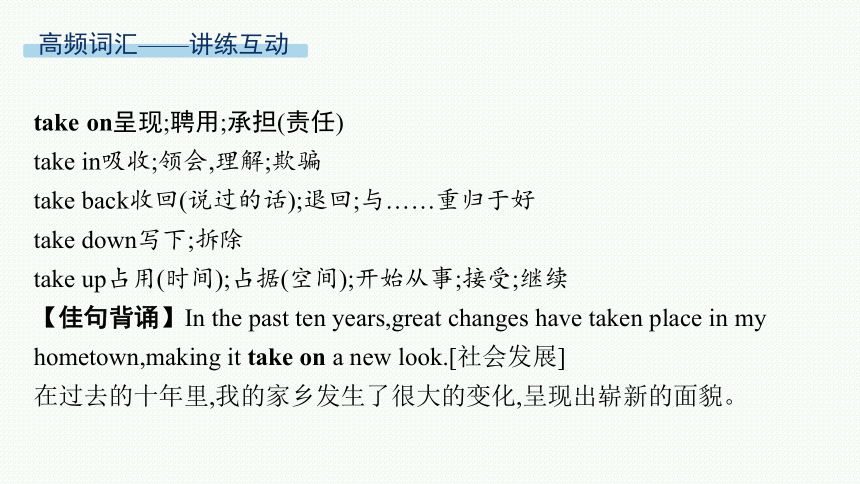
文档简介
(共28张PPT)
UNIT 5
Learning About Language
Part 1 Language points
Part 2 Grammar
目录索引
Part 1 Language points
基础落实 必备知识全过关
Ⅰ.重点单词
必记写作词汇
1. adj.城市的;都市的;城镇的
2. adj.与化学有关的;化学的
n.化学制品;化学品
3. n.小麦;小麦籽
4. n.味道;特点;特色
urban
chemical
wheat
flavour
识记阅读词汇
1.bomb n.
vt.
2.tunnel n.
3.fertiliser n.
串记拓展词汇
n.扩建部分;扩大;电话分机→ v.延伸;扩大;推广
炸弹
轰炸;对……投炸弹
地下通道;地道;隧道
肥料
extension
extend
Ⅱ.重点短语
1. 下决心
2. 抱怨
3. 从……退休
4.live a healthy life
5.more and more
6.take on
make up one’s mind
complain about
retire from
过健康的生活
越来越多
呈现;聘用;承担(责任)
要点探究 能力素养全提升
基础词汇——语境记忆
1.urban adj.城市的;都市的;城镇的
【佳句背诵】The quality of urban living has been damaged by high noise levels.[环境保护]
城市生活的质量已被高噪声水平所破坏。
2.chemical adj.与化学有关的;化学的 n.化学制品;化学品
【佳句背诵】When it comes to environmental pollution,the chemical industry has a major responsibility.[环境保护]
谈到环境污染,化工产业负有主要的责任。
3.flavour n.味道;特点;特色
【佳句背诵】We have many kinds of food with different tastes and flavours.[饮食文化]
我们有各种各样的不同口味和风味的菜肴。
高频词汇——讲练互动
take on呈现;聘用;承担(责任)
take in吸收;领会,理解;欺骗
take back收回(说过的话);退回;与……重归于好
take down写下;拆除
take up占用(时间);占据(空间);开始从事;接受;继续
【佳句背诵】In the past ten years,great changes have taken place in my hometown,making it take on a new look.[社会发展]
在过去的十年里,我的家乡发生了很大的变化,呈现出崭新的面貌。
【即学即练】单句语法填空/单句写作
①The students find it easy to take what you teach.
②He took the challenges and tried to overcome them.
③She took the main points of the speech on the paper.
④她拒绝承担传统妇女的角色。
She refused to _______ _______ ________ ________ ________ ________.
in
up
down
take on the traditional woman’s role
Part 2 Grammar
情景导入
主语从句
阅读下面短文,体会句中黑体部分的用法。
①It is well known that Wendy was a famous writer,but no one knew where she came from and ②whether she was born in 1961 was still a mystery.③What they did know was that she was loved by poor people because ④who(ever) was in need of money could get help from her.Wendy was generous and helpful,but some people thought she was chasing fame. Wendy said she didn’t understand why they were so narrow-minded,but ⑤it didn’t matter what others thought of her,and ⑥it was important that what(ever) she thought was right and meaningful.
I think that is where the meaning of life lies.
【语法感悟】
短文中的黑体部分都是从句在复合句中作主语,称为 从句。这类从句通常直接放在句首作主语,如短文中的 ;有时也可用it作形式主语,把 移到句子的末尾,如 。
主语
②③④
主语从句
①⑤⑥
语法精讲
如果一个从句在句子中担当主语,那么这个从句就是主语从句。主语从句通常放在主句的谓语动词之前,有时也由形式主语it代替,而本身放在句子末尾。
一、主语从句的引导词
类别 例词 说明
从属连词 that,whether 两者在从句中均不作成分,只起连接作用; that无实义,whether表示“是否”
连接代词 who,what,which,whoever,whatever等 在从句中作主语、宾语、表语、定语等成分
连接副词 when,where,how,why等 在从句中作时间、地点、方式、原因状语等成分
What we need is more water.(连接代词what在从句中作need的宾语)
我们需要的是更多的水。
Whether we can arrive there on time depends on the traffic.
我们是否能按时到达那里由交通情况决定。
When the delayed flight will take off depends much on the weather.
延迟的航班什么时候起飞主要取决于天气状况。
Why the man hadn’t reported the accident sooner was never clear.
谁都不清楚那个人为什么没更早一点报告那起事故。
Who the letter was from is still unknown.
这封信是谁寄的尚不清楚。
【即学即练】用whether,that,whoever填空
1. she became an artist may have been due to her father’s influence.
2. we will hold a party in the open air tomorrow depends on the weather.
3.Every year, makes the most beautiful kite will win a prize in the Kite Festival.
That
Whether
whoever
二、it作形式主语
当句子主语过长时,为保持句子平衡,避免头重脚轻,常把主语从句后置,而用形式主语it代替。it作形式主语时常用于以下句型:
句型 说明
it+系动词+形容词+主语从句 常用于此句型的形容词有important,(un)likely,possible,necessary,natural,wrong等
it+系动词+名词(词组)+主语从句 常用于此句型的名词(词组)有a fact,an idea,an honour,a wonder,no wonder,a pity等
it+系动词+过去分词+主语从句 常用于此句型的过去分词有known,proved,said,decided,suggested,thought等
it+不及物动词+主语从句 常用于此句型的动词有appear,happen,seem,occur,matter等
It is very important that a student (should) learn English well.
学生学好英语很重要。
It depends on the weather whether they are going shopping today.
他们今天是否去购物取决于天气情况。
For example,it can be proved that China has more people than any other country in the world.
举例来说,中国人口比世界上其他任何国家的人口都多,这是可以得到证实的。
【温馨提示】
需要注意的是,it 作形式主语代替主语从句时,要注意和 as 引导的定语从句的区别。试比较:
It was reported that the US was under the terrorist attack.(it 代替主语从句,句中有 that,无逗号)
As was reported,the US was under the terrorist attack.(as 引导定语从句,句中无 that,有逗号)
据报道,美国遭到恐怖分子的袭击。
【名师点津】
1.从句的语序
在任何情况下,主语从句都用陈述语序。
Whichever of you gets here first will get the prize.
你们谁第一个到达这里谁就获奖。
2.主谓一致
(1)从句作主语时,主句的谓语一般用单数形式;但what和who引导主语从句时,有时主句谓语的数应与主句中作表语的名词保持一致。
When we shall have our sports meeting has not been decided.
我们什么时候开运动会还没有确定。
What they need are books.
他们需要的是书。
(2)如果由and连接两个或两个以上的主语从句作主语时,谓语动词用复数;由两个或多个连接词引导一个主语从句时,谓语动词用单数。
When they will start and where they will go have not been decided yet.
他们什么时候动身以及要去哪里还没定下来。
How and why he came to this city is a story of struggle and success.
他如何及为什么来到这个城市是一个充满奋斗和成功的故事。
3.if 和 whether 的选用
whether 和 if 尽管不充当句子成分,但含有“是否”的意思。if 可以引导主语从句,但从句不能用于句首,而应该放在句尾,并用 it 作形式主语。whether还可以与or not连用,语意不变。
Whether genetically-modified food does us harm remains to be seen.
=It remains to be seen whether/if genetically-modified food does us harm.
转基因食物对我们是否有害有待观察。
4.that 和 what 的选用
that 和 what 都可引导主语从句。what 除了起连接作用外,还在从句中充当某些成分,如主语、宾语或表语。而 that 在从句中不充当任何成分,无词义,只起连接作用。
What caused the accident was a man lying on the ground.
引起这次事故的是一个躺在地上的男人。
That she was at the entrance to the cinema then was a big surprise to me.
她当时在电影院入口处对我来说是一件让人大吃一惊的事。
5.whatever和 whoever 的选用
whatever和whoever在主语从句中不含疑问意义,不仅起连接作用,还在从句中作成分。whatever相当于anything that;whoever相当于anyone who。要注意whatever,whoever 引导的主语从句和让步状语从句的区别。试比较:
Whoever breaks the law should be punished.(=Anyone who breaks the law should be punished.) (whoever引导的是主语从句)
Whoever breaks the law,he should be punished.(=No matter who breaks the law,he should be punished.) (whoever 引导的是让步状语从句)
无论谁破坏法律,都应受到惩罚。
【即学即练】单句写作
1.据报道明天会下雨。
________ ________ ________ ________ it’ll rain tomorrow.
2.无论是谁干的,迟早都会被抓住。
________ ________ ________ will be caught sooner or later.
3.我突然想到自己应该多做点家务活。
________ ________ ________ ________ ________ I should do more housework.
It is reported that
Whoever did this
It occurred to me that
本 课 结 束
UNIT 5
Learning About Language
Part 1 Language points
Part 2 Grammar
目录索引
Part 1 Language points
基础落实 必备知识全过关
Ⅰ.重点单词
必记写作词汇
1. adj.城市的;都市的;城镇的
2. adj.与化学有关的;化学的
n.化学制品;化学品
3. n.小麦;小麦籽
4. n.味道;特点;特色
urban
chemical
wheat
flavour
识记阅读词汇
1.bomb n.
vt.
2.tunnel n.
3.fertiliser n.
串记拓展词汇
n.扩建部分;扩大;电话分机→ v.延伸;扩大;推广
炸弹
轰炸;对……投炸弹
地下通道;地道;隧道
肥料
extension
extend
Ⅱ.重点短语
1. 下决心
2. 抱怨
3. 从……退休
4.live a healthy life
5.more and more
6.take on
make up one’s mind
complain about
retire from
过健康的生活
越来越多
呈现;聘用;承担(责任)
要点探究 能力素养全提升
基础词汇——语境记忆
1.urban adj.城市的;都市的;城镇的
【佳句背诵】The quality of urban living has been damaged by high noise levels.[环境保护]
城市生活的质量已被高噪声水平所破坏。
2.chemical adj.与化学有关的;化学的 n.化学制品;化学品
【佳句背诵】When it comes to environmental pollution,the chemical industry has a major responsibility.[环境保护]
谈到环境污染,化工产业负有主要的责任。
3.flavour n.味道;特点;特色
【佳句背诵】We have many kinds of food with different tastes and flavours.[饮食文化]
我们有各种各样的不同口味和风味的菜肴。
高频词汇——讲练互动
take on呈现;聘用;承担(责任)
take in吸收;领会,理解;欺骗
take back收回(说过的话);退回;与……重归于好
take down写下;拆除
take up占用(时间);占据(空间);开始从事;接受;继续
【佳句背诵】In the past ten years,great changes have taken place in my hometown,making it take on a new look.[社会发展]
在过去的十年里,我的家乡发生了很大的变化,呈现出崭新的面貌。
【即学即练】单句语法填空/单句写作
①The students find it easy to take what you teach.
②He took the challenges and tried to overcome them.
③She took the main points of the speech on the paper.
④她拒绝承担传统妇女的角色。
She refused to _______ _______ ________ ________ ________ ________.
in
up
down
take on the traditional woman’s role
Part 2 Grammar
情景导入
主语从句
阅读下面短文,体会句中黑体部分的用法。
①It is well known that Wendy was a famous writer,but no one knew where she came from and ②whether she was born in 1961 was still a mystery.③What they did know was that she was loved by poor people because ④who(ever) was in need of money could get help from her.Wendy was generous and helpful,but some people thought she was chasing fame. Wendy said she didn’t understand why they were so narrow-minded,but ⑤it didn’t matter what others thought of her,and ⑥it was important that what(ever) she thought was right and meaningful.
I think that is where the meaning of life lies.
【语法感悟】
短文中的黑体部分都是从句在复合句中作主语,称为 从句。这类从句通常直接放在句首作主语,如短文中的 ;有时也可用it作形式主语,把 移到句子的末尾,如 。
主语
②③④
主语从句
①⑤⑥
语法精讲
如果一个从句在句子中担当主语,那么这个从句就是主语从句。主语从句通常放在主句的谓语动词之前,有时也由形式主语it代替,而本身放在句子末尾。
一、主语从句的引导词
类别 例词 说明
从属连词 that,whether 两者在从句中均不作成分,只起连接作用; that无实义,whether表示“是否”
连接代词 who,what,which,whoever,whatever等 在从句中作主语、宾语、表语、定语等成分
连接副词 when,where,how,why等 在从句中作时间、地点、方式、原因状语等成分
What we need is more water.(连接代词what在从句中作need的宾语)
我们需要的是更多的水。
Whether we can arrive there on time depends on the traffic.
我们是否能按时到达那里由交通情况决定。
When the delayed flight will take off depends much on the weather.
延迟的航班什么时候起飞主要取决于天气状况。
Why the man hadn’t reported the accident sooner was never clear.
谁都不清楚那个人为什么没更早一点报告那起事故。
Who the letter was from is still unknown.
这封信是谁寄的尚不清楚。
【即学即练】用whether,that,whoever填空
1. she became an artist may have been due to her father’s influence.
2. we will hold a party in the open air tomorrow depends on the weather.
3.Every year, makes the most beautiful kite will win a prize in the Kite Festival.
That
Whether
whoever
二、it作形式主语
当句子主语过长时,为保持句子平衡,避免头重脚轻,常把主语从句后置,而用形式主语it代替。it作形式主语时常用于以下句型:
句型 说明
it+系动词+形容词+主语从句 常用于此句型的形容词有important,(un)likely,possible,necessary,natural,wrong等
it+系动词+名词(词组)+主语从句 常用于此句型的名词(词组)有a fact,an idea,an honour,a wonder,no wonder,a pity等
it+系动词+过去分词+主语从句 常用于此句型的过去分词有known,proved,said,decided,suggested,thought等
it+不及物动词+主语从句 常用于此句型的动词有appear,happen,seem,occur,matter等
It is very important that a student (should) learn English well.
学生学好英语很重要。
It depends on the weather whether they are going shopping today.
他们今天是否去购物取决于天气情况。
For example,it can be proved that China has more people than any other country in the world.
举例来说,中国人口比世界上其他任何国家的人口都多,这是可以得到证实的。
【温馨提示】
需要注意的是,it 作形式主语代替主语从句时,要注意和 as 引导的定语从句的区别。试比较:
It was reported that the US was under the terrorist attack.(it 代替主语从句,句中有 that,无逗号)
As was reported,the US was under the terrorist attack.(as 引导定语从句,句中无 that,有逗号)
据报道,美国遭到恐怖分子的袭击。
【名师点津】
1.从句的语序
在任何情况下,主语从句都用陈述语序。
Whichever of you gets here first will get the prize.
你们谁第一个到达这里谁就获奖。
2.主谓一致
(1)从句作主语时,主句的谓语一般用单数形式;但what和who引导主语从句时,有时主句谓语的数应与主句中作表语的名词保持一致。
When we shall have our sports meeting has not been decided.
我们什么时候开运动会还没有确定。
What they need are books.
他们需要的是书。
(2)如果由and连接两个或两个以上的主语从句作主语时,谓语动词用复数;由两个或多个连接词引导一个主语从句时,谓语动词用单数。
When they will start and where they will go have not been decided yet.
他们什么时候动身以及要去哪里还没定下来。
How and why he came to this city is a story of struggle and success.
他如何及为什么来到这个城市是一个充满奋斗和成功的故事。
3.if 和 whether 的选用
whether 和 if 尽管不充当句子成分,但含有“是否”的意思。if 可以引导主语从句,但从句不能用于句首,而应该放在句尾,并用 it 作形式主语。whether还可以与or not连用,语意不变。
Whether genetically-modified food does us harm remains to be seen.
=It remains to be seen whether/if genetically-modified food does us harm.
转基因食物对我们是否有害有待观察。
4.that 和 what 的选用
that 和 what 都可引导主语从句。what 除了起连接作用外,还在从句中充当某些成分,如主语、宾语或表语。而 that 在从句中不充当任何成分,无词义,只起连接作用。
What caused the accident was a man lying on the ground.
引起这次事故的是一个躺在地上的男人。
That she was at the entrance to the cinema then was a big surprise to me.
她当时在电影院入口处对我来说是一件让人大吃一惊的事。
5.whatever和 whoever 的选用
whatever和whoever在主语从句中不含疑问意义,不仅起连接作用,还在从句中作成分。whatever相当于anything that;whoever相当于anyone who。要注意whatever,whoever 引导的主语从句和让步状语从句的区别。试比较:
Whoever breaks the law should be punished.(=Anyone who breaks the law should be punished.) (whoever引导的是主语从句)
Whoever breaks the law,he should be punished.(=No matter who breaks the law,he should be punished.) (whoever 引导的是让步状语从句)
无论谁破坏法律,都应受到惩罚。
【即学即练】单句写作
1.据报道明天会下雨。
________ ________ ________ ________ it’ll rain tomorrow.
2.无论是谁干的,迟早都会被抓住。
________ ________ ________ will be caught sooner or later.
3.我突然想到自己应该多做点家务活。
________ ________ ________ ________ ________ I should do more housework.
It is reported that
Whoever did this
It occurred to me that
本 课 结 束
